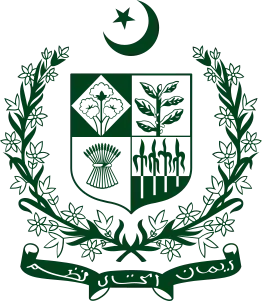Sipah-e-Muhammad Pakistan
Sipah-e-Muhammad Pakistan (S.M.P) (Urdu: سپاہ محمد پاکستان; Arabic: سباه محمد الباكستانيه; English: Soldiers of Muhammad) is a Shia militant organisation and a former political party based in Pakistan that was formed in 1993 as a response to sectarian violence against Pakistani Shia Muslims orchestrated by Deobandi militant movement such as Sipah-e-Sahaba Pakistan (also known Lashkar-e-Jhangvi). On August 14, 2001, it was banned by President Pervez Musharraf as a terrorist organisation. Because its real leader Mureed Abbas Yazdani was killed by unknown persons
Sipah-e-Muhammad سپاہ محمد صلی الله علیہ وآلہ وسلم | |
|---|---|
| Leader | Moulana Mureed Abbas Yazdani Than Syed Ghulam Raza Naqvi (imprisoned 1996, freed 2014) |
| Founded | 1994 (officially) |
| Headquarters | Thokar Niaz Beg, Lahore, Pakistan |
| Ideology | Protection of Shi'a community, armed resistance to Wahhabi/Takfiri terrorism and target killing |
| Religion | Shia Islam |
| Colors | Black and Yellow |
| Slogan | "Humiliation of us is impossible." (Arabic: هيهات منا الذلة) |
| Parliament of Pakistan | 0 / 342
|
 |
|---|
| This article is part of a series on the politics and government of Pakistan |
|
|
History
Shia leader Maulana Mureed Abbas Yazdani formed Sipa-e-Muhammad Pakistan in 1993; it is believed to be armed wing of Tehreek-e-Jafria Pakistan. It is involved in assassination of Sipah-e-Sahaba-linked sectarian clerics and other figures that are responsible for the ongoing anti-Shia violence in Pakistan. It is accused of killing of central leadership of Sipa-e-Sahabah starting from Haq Nawaz Jhangvi to many assassinations in Karachi and Rawalpindi. Its headquarters is in Thokar Niaz Beg, Lahore and its leader was Ghulam Raza Naqvi who was imprisoned in 1996 and released in 2014. Since his death in 2016, it is unclear who leads the group.
Activities
Sipah-e-Muhammad's primary aim was to target the sectarian leadership of the banned terrorist Deobandi militia Sipah-e-Sahaba or Lashkar-e-Jhangvi. However, with the subsequent rise in the violence against Shia Muslims, it was thought to be reforming.[1]
The movement was strong in various Shia communities in Pakistan, and in the majority Shia town of Thokar Niaz Beg of Lahore, ran a "virtual state within a state" in the 1990s.[2]
Designation as a terrorist organization
The Government of Pakistan designated Sipah-e-Muhammad a terrorist organization in 2002; it is classified as a Foreign Terrorist Organization under U.S. law. As a result, its finances are blocked worldwide by the U.S government.
See also
References
- Daily Times.com Vengeance, frictions reviving LJ and Sipah-e-Muhammad. April 7th, 2004
- Ravinder Kaur (5 November 2005). Religion, Violence and Political Mobilisation in South Asia. SAGE Publications. pp. 154–. ISBN 978-0-7619-3431-8.
- "'200 Iranian-trained Sipah-e-Muhammad activists hunting down ASWJ workers'". www.pakistantoday.com.pk. Retrieved 2018-07-26.